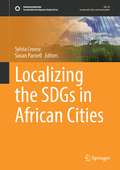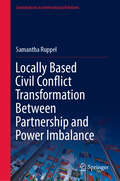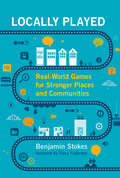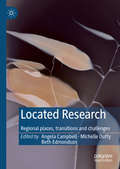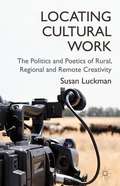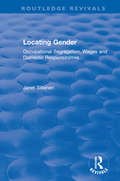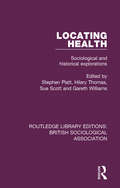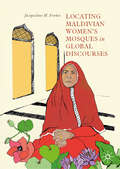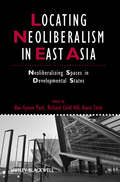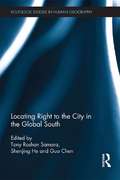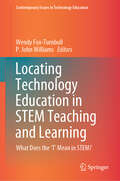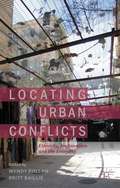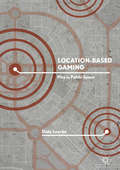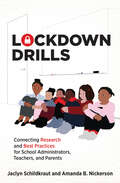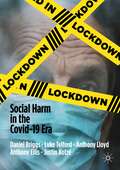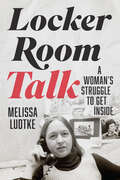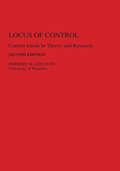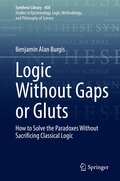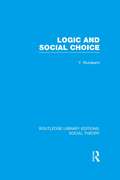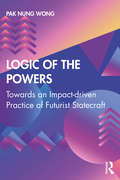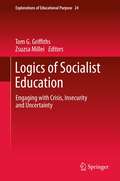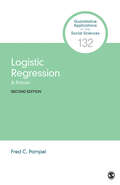- Table View
- List View
Localizing the SDGs in African Cities (Sustainable Development Goals Series)
by Susan Parnell Sylvia CroeseThis volume brings together a unique set of interventions from a variety of contributors to bridge the gap between research and policy with a distinct focus on Africa, drawing on work conducted as part of multiple interconnected research projects and networks on the Sustainable Development Goals (SDGs) and global policy implementation in African cities. Through the framework of the SDGs, and in particular Goal 11, the book aims to contribute to generating new knowledge about approaches to SDG localization that are grounded in complex and diverse local contexts, needs and realities, integrated perspectives and collaborative research. The volume draws together contributions from urban experts from different professional and disciplinary backgrounds, ranging from the fields of governance, planning, data, sustainability, health and finance, to provide critical insight into the current dynamics, actors, blind spots, constraints and also good practices and opportunities for realizing the SDGs in Africa. Readers will gain detailed and informed insight into the African experience of SDG localization, monitoring and implementation based on multiple case studies, and will learn of the practices needed to accelerate action towards achieving the SDGs in urban contexts. This book will be of interest to researchers and planners focusing on SDGs implementation in Africa, as well as government organizations, development practitioners and students committed to long-term, inclusive sustainable and participatory development.
Locally Based Civil Conflict Transformation Between Partnership and Power Imbalance (Contributions to International Relations)
by Samantha RuppelThis book examines the processes and dynamics of cooperation between different actors in civil peace service projects in Kenya, Sierra Leone and Liberia. The joint handling of conflicts and peacebuilding challenges by local and international actors has a long tradition in German peace work and is becoming increasingly important in a globalized world. Therefore, the book explores the question, relevant for both academia and peace practitioners, to what extent an equal partnership can exist in the context of civil conflict transformation. By focusing on the opportunities and challenges of cooperation, the work succeeds in focusing on everyday activities, analyzing the actual processes and frictions of peace work, and making a valuable contribution to critical peace research and the discussion of hybridity and friction.
Locally Played: Real-World Games for Stronger Places and Communities (The\mit Press Ser.)
by Benjamin StokesHow games can make a real-world difference in communities when city leaders tap into the power of play for local impact.In 2016, city officials were surprised when Pokémon GO brought millions of players out into the public space, blending digital participation with the physical. Yet for local control and empowerment, a new framework is needed to guide the power of mixed reality and pervasive play. In Locally Played, Benjamin Stokes describes the rise of games that can connect strangers across zip codes, support the “buy local” economy, and build cohesion in the fight for equity. With a mix of high- and low-tech games, Stokes shows, cities can tap into the power of play for the good of the group, including healthier neighborhoods and stronger communities. Stokes shows how impact is greatest when games “fit” to the local community—not just in terms of culture, but at the level of group identity and network structure. By pairing design principles with a range of empirical methods, Stokes investigates the impact of several games, including Macon Money, where an alternative currency encouraged people to cross lines of socioeconomic segregation in Macon, Georgia; Reality Ends Here, where teams in Los Angeles competed to tell multimedia stories around local mythology; and Pokémon GO, appropriated by several cities to serve local needs through local libraries and open street festivals. Locally Played provides game designers with a model to strengthen existing networks tied to place and gives city leaders tools to look past technology trends in order to make a difference in the real world.
Located Research: Regional places, transitions and challenges
by Angela Campbell Beth Edmondson Michelle DuffyThis book examines the diversity of practice in regional research and its contribution to local, national and global issues. Three themes are advanced here: Place and change, Transition and resilience, and Challenges for the future. Contributors embrace frameworks of co-design and transdisciplinary practice to build communities of practice in response to lived experience in regional contexts. Their work highlights the strategic importance of a regional focus at a time when global connectivity and mobility is increasing and the complexity of ‘wicked’ problems demands more than one approach or solution. Such complex problems require nuanced, and at times ‘bespoke’ methodological approaches to better understand and support not just regional adaptation, resilience and transformation, but to manage all these things at a time when change is everywhere.
Locating Cultural Work
by Susan LuckmanDrawing upon field work and interviews with cultural workers in the UK and Australia, this book examines the cultural work experiences of rural, regional and remotely located creative practitioners, and how this sits within local economies and communities.
Locating Gender: Occupational Segregation, Wages and Domestic Responsibilities
by Janet SiltanenFirst published in 1994, Locating Gender combines a case-study approach with significant theoretical development to challenge explanations of occupational segregation. It examines the diversity of women’s employment experience, gender segregation within employment establishments, employment and domestic relations, and the place of gender in perceptions of inequality. The book develops the concepts of component-wage and full-wage jobs in the context of work histories and employment relations, and establishes their usefulness in the study of the social adequacy of wages. In doing so, it provides a close and critical examination of the power of gender as an explanatory concept in employment and domestic relations, including an in-depth analysis of the circumstances prior to, and following, changes to eliminate sex discrimination from official practices in a particular workplace. It will be of interest to students and researchers of gender studies, the sociology of work and social stratification, social policy, business studies, and labour economics.
Locating Health: Sociological and Historical Explorations (Routledge Library Editions: British Sociological Association #16)
by Gareth Williams Stephen Platt Sue Scott Hilary ThomasOriginally presented as papers in the 1991 British Sociological Association Conference on Health and Society, Locating Health represents a valuable addition to the ‘health inequalities’ debate by extending our gaze beyond the traditional locations to include place, consumption and lifestyle. It offers reconceptualization of key theoretical terms, including work, income, and public/private domains as well as addressing the reciprocal influence of health and social location, for example early retirement; and highlighting the health consequences of multiple locations, such as gender and class, gender and age.
Locating Maldivian Women’s Mosques in Global Discourses
by Jacqueline H. FewkesIn this ethnographic examination of women’s mosques in the Maldives, anthropologist Jacqueline H. Fewkes probes how the existence of these separate buildings—where women lead prayers for other women—intersect with larger questions about gender, space, and global Muslim communities. Bringing together ethnographic insight with historical accounts, this volume develops an understanding of the particular religious and cultural trends in the Maldives that have given rise to these unique socio-religious institutions. As Fewkes considers women’s spaces in the Maldives as a practice apart from contemporary global Islamic customs, she interrogates the intersections between local, national, and transnational communities in the development of Islamic spaces, linking together the role of nations in the formation of Muslim social spaces with transnational conceptualizations of Islamic gendered spaces. Using the Maldivian women’s mosque as a starting point, this book addresses the roles of both the nation and the global Muslim ummah in locating gendered spaces within discourses about gender and Islam.
Locating Neoliberalism in East Asia: Neoliberalizing Spaces in Developmental States (IJURR Studies in Urban and Social Change Book Series #70)
by Asato Saito Bae-Gyoon Park Richard Child HillLocating Neoliberalism in East Asia: Neoliberalizing Spaces in Developmental States examines the influence of neo-liberal ideologies on urban and regional policies and practices in several Asian Pacific nations. Represents one of the few studies of neoliberal changes in East Asia, one of the most important topics in social science research over the past two decades Considers the Asian perspective by focusing on readings from Asian experts Pays special attention to the ‘spatial' dimension of the East Asian neoliberalization Examines the influence of neo-liberal ideologies on urban and regional policies and practices in several Asian Pacific nations Explores the evolving relationship between the two political economies
Locating Right to the City in the Global South (Routledge Studies in Human Geography)
by Shenjing He Tony Roshan Samara Guo ChenDespite the fact that virtually all urban growth is occurring, and will continue to occur, in the cities of the Global South, the conceptual tools used to study cities are distilled disproportionately from research on the highly developed cities of the Global North. With urban inequality widely recognized as central to many of the most pressing challenges facing the world, there is a need for a deeper understanding of cities of the South on their own terms. Locating Right to the City in the Global South marks an innovative and far reaching effort to document and make sense of urban transformations across a range of cities, as well as the conflicts and struggles for social justice these are generating. The volume contains empirically rich, theoretically informed case studies focused on the social, spatial, and political dimensions of urban inequality in the Global South. Drawing from scholars with extensive fieldwork experience, this volume covers sixteen cities in fourteen countries across a belt stretching from Latin America, to Africa and the Middle East, and into Asia. Central to what binds these cities are deeply rooted, complex, and dynamic processes of social and spatial division that are being actively reproduced. These cities are not so much fracturing as they are being divided by governance practices informed by local histories and political contestation, and refracted through or infused by market based approaches to urban development. Through a close examination of these practices and resistance to them, this volume provides perspectives on neoliberalism and right to the city that advance our understanding of urbanism in the Global South. In mapping the relationships between space, politics and populations, the volume draws attention to variations shaped by local circumstances, while simultaneously elaborating a distinctive transnational Southern urbanism. It provides indepth research on a range of practical and policy oriented issues, from housing and slum redevelopment to building democratic cities that include participation by lower income and other marginal groups. It will be of interest to students and practitioners alike studying Urban Studies, Globalization, and Development.
Locating Technology Education in STEM Teaching and Learning: What Does the ‘T’ Mean in STEM? (Contemporary Issues in Technology Education)
by P. John Williams Wendy Fox-TurnbullThis book offers clarity and consistency of thinking in relation to Technology Education when situated within a STEM approach to teaching. It examines the range of Innovations and Issues which are being considered by schools as they implement STEM, with particular focus on the place of Technology, or the ‘T’ in STEM. The book is divided into three sections: Philosophy, Implementation and Issues and Innovations, with each containing five to seven chapters. The first section lays the foundations for the remainder of the book: it focuses the readers on the technology aspect of STEM education and situates it to align with the international understanding of technology education. The second section provides insights into how STEM is best implemented to give technology due consideration across a range of disciplines with technology education, including engineering, food technology, and textile technology. This section also provides suggestions for the successful implementation of the STEM approach, and offers further insight through a range of case studies. The third section outlines and discusses a range of issues that pose a threat to the position and understanding of technology within the STEM teaching and learning approach. This section also examines how technology and STEM are situated within, are supported or are threatened by, other current innovations and approaches to teaching an integrated curriculum, such as the Maker Space Movement and Play-based Learning.
Locating Urban Conflicts
by Wendy Pullan Britt BaillieCities have emerged as the epicentres for many of today's ethno-national and religious conflicts. This book brings together key themes that dominate our current attention including emerging areas of contestation in rapidly changing and modernising cities and the effects of extreme and/or enduring conflicts upon ordinary civilian life.
Location-Based Gaming: Play in Public Space
by Dale LeorkeLocation-based games emerged in the early 2000s following the commercialisation of GPS and artistic experimentation with ‘locative media’ technologies. Location-based games are played in everyday public spaces using GPS and networked, mobile technologies to track their players’ location. This book traces the evolution of location-based gaming, from its emergence as a marginal practice to its recent popularisation through smartphone apps like Pokémon Go and its incorporation into ‘smart city’ strategies. Drawing on this history and an analysis of the scholarly and mainstream literature on location-based games, Leorke unpacks the key claims made about them. These claims position location-based games as alternately enriching or diminishing their players’ engagement with the people and places they encounter through the game. Through rich case studies and interviews with location-based game designers and players, Leorke tests out and challenges these celebratory and pessimistic discourses. He argues for a more grounded approach to researching location-based games and their impact on public space that reflects the ideologies, lived experiences, and institutional imperatives that circulate around their design and performance. By situating location-based games within broader debates about the role of play and digitisation in public life, Location-Based Gaming offers an original and timely account of location-based gaming and its growing prominence.
Lockdown Drills: Connecting Research and Best Practices for School Administrators, Teachers, and Parents
by Jaclyn Schildkraut Amanda B. NickersonA comprehensive resource on what lockdown drills are, why they are necessary, and how best to conduct them.The first book to offer a comprehensive examination of lockdown drills in K–12 schools, Lockdown Drills balances research findings with practical applications and implications. Schildkraut and Nickerson, school safety experts with complementary backgrounds in criminology and school psychology, review the historical precedents for lockdown drills, distinguish school lockdowns from other emergency procedures (such as active shooter drills), explain why they are conducted, present evidence-based research on their effectiveness, and describe how to conduct them according to best practices. Proponents of lockdown drills as a life-saving necessity, the authors help to bring much-needed standardization to how these drills are studied and conducted. The authors present common arguments for and against the inclusion of lockdown drills in emergency preparedness efforts, balancing their discussion of the perceptions and psychological impacts of lockdown drills with scholarly research on the extent to which lockdown drills improve how effectively individuals respond to a potential threat. Placing lockdown drills in the larger context of school safety and preparedness, they examine the broader implications for policymakers. Finally, they emphasize that drills, of which lockdowns are only one type, are just a part of the complex school safety puzzle. Ensuring that schools are safe places for students and educators begins long before a crisis occurs and continues through the days, weeks, and years of recovery following a crisis.
Lockdown Life: The Pandemic Experience for Older Diarists
by Nicola MadgeThe COVID-19 pandemic took many by surprise when it arrived in Britain in early 2020. Daily lives changed dramatically from March with the introduction of unprecedented restrictions and lockdowns. How did people react? This book draws on the diaries of 68 men and women aged 70 and above, capturing their thoughts and experiences over the following months. Although these older diarists considered themselves among the more fortunate at the time, their entries reveal both highs and lows. There were anxieties and frustrations but also much positivity and, often, a reluctance for an over-hasty return to pre-pandemic times. Through these personal and contemporaneous accounts, the book offers a unique contribution to our understanding of the pandemic and its significance in modern social history.
Lockdown: Social Harm in the Covid-19 Era
by Daniel Briggs Justin Kotzé Anthony Lloyd Anthony Ellis Luke TelfordThis book asks whether the decision to lock down the world was justified in proportion to the potential harms and risks generated by the Covid-19 virus. Drawing on global, empirical data, it explores and exposes the social harms induced by lockdowns, many of which are 'hidden', including joblessness, mental health problems and an intensification of societal inequalities and divisions. It offers data-driven case studies on harms such as domestic violence, child abuse, the distress of being ordered to stay at home, and the numerous harms associated with the new wealth industries. It explores why some people weren't compliant with lockdown restrictions and examines the already vulnerable social groups who were disproportionally affected by lockdown including those who were locked in (care home residents), locked up (prisoners), and locked out (migrant workers, refugees). The book closes with a brief discussion on what the future might look like as we enter a post-Covid world, drawing on cutting-edge social theory.
Locker Room Talk: A Woman’s Struggle to Get Inside
by Melissa LudtkeWhile sportswriters rushed into Major League Baseball locker rooms to talk with players, MLB Commissioner Bowie Kuhn barred the lone woman from entering along with them. That reporter, 26-year-old Sports Illustrated reporter Melissa Ludtke, charged Kuhn with gender discrimination, and after the lawyers argued Ludtke v. Kuhn in federal court, she won. Her 1978 groundbreaking case affirmed her equal rights, and the judge’s order opened the doors for several generations of women to be hired in sports media. Locker Room Talk is Ludtke’s gripping account of being at the core of this globally covered case that churned up ugly prejudices about the place of women in sports. Kuhn claimed that allowing women into locker rooms would violate his players’ “sexual privacy.” Late-night television comedy sketches mocked her, as newspaper cartoonists portrayed her as a sexy, buxom looker who wanted to ogle the naked athletes’ bodies. She weaves these public perspectives throughout her vivid depiction of the court drama overseen by Judge Constance Baker Motley, the first Black woman to serve on the federal bench. She recounts how her lawyer, F.A.O. “Fritz” Schwarz, employed an ingenious legal strategy that persuaded Judge Motley to invoke the Fourteenth Amendment’s Equal Protection Clause in giving Ludtke access identical to that of her male counterparts. Locker Room Talk is both an inspiring story of one woman’s determination to do a job dominated by men and an illuminating portrait of a defining moment for women’s rights.
Locus of Control: Current Trends in Theory & Research
by Herbert M. LefcourtFirst published in 1982. Routledge is an imprint of Taylor & Francis, an informa company.
Logic Without Gaps or Gluts: How to Solve the Paradoxes Without Sacrificing Classical Logic (Synthese Library #458)
by Benjamin Alan BurgisThis book offers a defense against non-classical approaches to the paradoxes. The author argues that, despite appearances, the paradoxes give no reason at all to reject classical logic. In fact, he believes classical solutions fare better than non-classical ones with respect to key tests like Curry’s Paradox, a Liar-like paradox that dialetheists are forced to solve in a way totally disjoint from their solution to the Liar. Graham Priest’s In Contradiction was the first major work that advocated the use of non-classical approaches. Since then, these views have moved into the philosophical mainstream. Much of this movement is fueled by a widespread sense that these logically heterodox solutions get to the real nub of the issue. They lack the ad hoc feel of many other solutions to the paradoxes. The author believes that it's long past time for a response to these attacks against classical orthodoxy. He presents a non-logically-revisionary solution to the paradoxes. This title offers a literal way of cashing out the disquotation metaphor. While the details of the view are novel, the idea has a pre-history in the relevant literature. The author examines objections in detail. He rejects each in turn and concludes by comparing the virtues of his logically orthodox approach with those of the paraconsistent and paracomplete competition.
Logic and Social Choice (Routledge Library Editions: Social Theory)
by Yasusuke MurakamiHow is a social decision made out of individual members' decisions? This is one of the primary questions in the social sciences. Logic and Social Choice provides an answer to the topic by the application of mathematical logic. Yasusuke Murakami formulates social decision-making in logical terms, and shows that an analysis of social decision is equivalent to a logical calculus in many-valued logic. The logical conditions are then derived for various types of societies, especially for democracy. This foundation enables the author to discuss such topics as the relation between direct democracy and the representative system, a comparison of various rules of election, and the stability of social decision. The main conclusion is that inconsistency or paradox is inherent not only in voting and in democracy itself, but also in any piecemeal social decision-making.
Logic of the Powers: Towards an Impact-driven Practice of Futurist Statecraft
by Pak Nung WongWhat global future would ensure hope, justice and peace to the human mankind? In view of a fast evolving post-Covid world order, this volume explores a novel Christian post-colonial approach to global affairs. It examines the existing ‘sociology of the powers’ theoretical scheme, the debate between Christian realism and Christian pacifism, the method and practice of prophetic witnessing, to elaborate a new Christian approach to statecraft and futurology in terms of theory, methodology and ontology. This book: • Uses the COVID-19 pandemic as the background to examine why and how the pandemic has accelerated the US’s decline, and to identify the tacit game rules that contributed to the UK government’s mishandling of the pandemic; • Compares the political systems between China and the West, and engages with selected theoretical narratives from the Global South to envision an alternative ‘shared globalisation’ project; • Argues why it is important for post-colonial Christian individuals and communities to get involved in this global discussion for a new world order of complex realist interdependencies grounded on hope, social justice and peace. A fresh take on global politics and international relations, this volume will be of great interest to scholars and researchers of political science, religious studies, peace studies, theology and future studies.
Logics of Disintegration: Post-Structuralist Thought and the Claims of Critical Theory
by Peter DewsThis book examines the relationship between post-structuralism and Frankfurt School critical theory. It also questions the "novelty" of post-structuralist claims, using, for instance, the debate between Fichte and Schelling to show that such terrain as radical subjectivity has been broached before. The book explores the danger of allowing post-structuralism to remain unchecked and the possible "disastrous" political consequences of such a "radical" theory.
Logics of Socialist Education
by Zsuzsa Millei Tom G. GriffithsFor some, socialism is a potent way of achieving economic, political and social transformations in the twenty-first century, while others find the very term socialism outdated. This book engages readers in a discussion about the viability of socialist views on education and identifies the capacity of some socialist ideas to address a range of widely recognized social ills. It argues that these pervasive social problems, which plague so-called 'developed' societies as much as they contribute to the poverty, humiliation and lack of prospects in the rest of the world, fundamentally challenge us to act. In our contemporary world-system, distancing ourselves from the injustices of others is neither viable nor defensible. Rather than waiting for radically new solutions to emerge, this book sees the possibility of transformation in the reconfiguration of existing social logics that comprise our modern societies, including logics of socialism. The book presents case studies that offer a critical examination of education in contemporary socialist contexts, as well as reconsidering examples of education under historical socialism. In charting these alternatives, and retooling past solutions in a nuanced way, it sets out compelling evidence that it is possible to think and act in ways that depart from today's dominant educational paradigm. It offers contemporary policy makers, researchers, and practitioners a cogent demonstration of the contemporary utility of educational ideas and solutions associated with socialism. A pioneering collection of essays which is central to understanding the historical and contemporary meanings of socialism in the context of neoliberal globalization. It is a most timely contribution to a growing intellectual project that challenges the hegemony of capitalism, while re-thinking and theorizing alternatives. Iveta Silova, Associate Professor of Comparative Education, Lehigh University, Bethlehem, PA, USA In this significant contribution to recent scholarship the authors use the lens of socialist education to offer an original critique of hegemonic capitalism, and present an intellectually rigorous search for alternatives by reconsidering historical socialism and advancing promising educational experiments that challenge the 'global architecture of education'. Anders Breidlid, Professor of International Education and Development, Oslo University College, Norway
Logistic Regression: A Primer (Quantitative Applications in the Social Sciences #132)
by Fred C. PampelThis volume helps readers understand the intuitive logic behind logistic regression through nontechnical language and simple examples. The Second Edition presents results from several statistical packages to help interpret the meaning of logistic regression coefficients, presents more detail on variations in logistic regression for multicategory outcomes, and describes some potential problems in interpreting logistic regression coefficients. A companion website includes the three data sets and Stata, SPSS, and R commands needed to reproduce all the tables and figures in the book. Finally, the Appendix reviews the meaning of logarithms, and helps readers understand the use of logarithms in logistic regression as well as in other types of models.
Logistic Regression: A Primer (Quantitative Applications in the Social Sciences #132)
by Fred C. PampelThis volume helps readers understand the intuitive logic behind logistic regression through nontechnical language and simple examples. The Second Edition presents results from several statistical packages to help interpret the meaning of logistic regression coefficients, presents more detail on variations in logistic regression for multicategory outcomes, and describes some potential problems in interpreting logistic regression coefficients. A companion website includes the three data sets and Stata, SPSS, and R commands needed to reproduce all the tables and figures in the book. Finally, the Appendix reviews the meaning of logarithms, and helps readers understand the use of logarithms in logistic regression as well as in other types of models.
